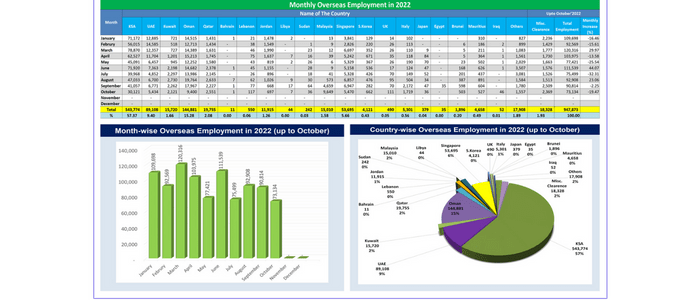Metropolis Report –
In spite of good news in the Malaysian labour market, the labour export during the period of October slipped 19.47 per cent compared to the previous month of September. Bangladesh exported a total of 73,134 workers during the month of October as against 90,814 workers to different countries during the month of September, according to Bureau, Manpower, Employment and Trading (BMET).
The manpower export in the traditional Gulf countries like KSA, Oman and UAE suffered during the month of October, while Bangladesh exported a record of 9,649 workers to Malaysia during the same period.
Bangladesh exported a total of 947,873 workers during the January-October period of the current calendar year as against 383,032 during the same period of the previous year posting nearly 247.46 per cent growth, according to Bureau, Manpower, Employment and Trading (BMET).
Saudi Arabia was the top destination of Bangladeshi workers with 543,774 workers (over 57.37 of the market share), followed by Oman with 144,881 workers (15.28%), UAE with 89,108 workers (9.40pc), Singapore with 53,695 (5.66%), Jordan with 11,915 workers (1.26 %), Qatar with 19,755 (2.08 %), Kuwait with 15,720 workers (1.66%), Italy with 5,301 workers (0.56%), Japan 379 (0.04 % ) and the UK with 490 workers (0.05%), according to BMET data.
Though Bangladesh’s labour export shot up by 247.46 per cent during the January-October period of this calendar year, compared to the same period of 2021, the prolonged Russia-Ukraine war and growing high cost of living may rein in the tempo of Bangladesh’s labour export to different countries in the mid-and long run, cautioned stakeholders concerned.
As the Russia-Ukraine war began, giving the wrong signal to the global economy, industrialists and businessmen in labour importing countries may slow down recruitment of workers on grounds of the high cost of living and possible social unrest, said a leading labour exporter.
Bangladesh exported a total of 1,008,525 workers in 2017, the highest number in one year, during the last 50 years.
Meanwhile, Mohammad Abul Bashar has been elected President and Shamim Ahmed Chowdhury as secretary general of the Bangladesh Association of International Recruiting Agencies (BAIRA) for the year 2022-2024.
Meanwhile, new Bangladesh Association of International Recruiting Agencies (BAIRA) President Mohammad Abul Bashar while talking to the daily said that new committee will work on speeding up manpower export to Malaysia.
Meanwhile, the manpower export recorded at 9,649 workers to the Southeast Asian country during the month of October with Bangladesh exporting a total of 15,010 workers during the January-October period of the current calendar year
Mohammad Abul Bashar, also an Awami League leader, said his panel has been against syndication of manpower export to Malaysia and will leave no stone unturned in boosting manpower to the Southeast Asian country.
Another report adds: As shared by Malaysia’s Ministry of Human Resources (MOHR), there are currently 1.3mn foreign workers in sectors that are allowed to hire and employ foreign workers. At the same time, more than 612,000 foreign workers have registered and passed the Safety and Health Inspection (SHE) checks in their home countries.
Additionally, 228,321 foreign workers (37.3% of the overall number) have been approved for Visas With Reference by the Immigration Department of Malaysia, and are waiting for arrival.
According to the ministry, the demand for foreign worker employment has hit about 1.8mn – the highest number ever received, it noted. In that vein, as of 26 September 2022, the ministry has approved a total of 541,315 quotas for the recruitment of foreign workers. Of that number, 436,613 quotas have made levy payments. Taking into account the 1.3mn foreign workers in Malaysia, and the 531,315 quotas that have been approved, MOHR highlighted that this number has “almost met the industry’s demand for foreign worker employment”.
Apart from the above, it was shared that upon discussions on the issue of foreign worker entry within the industries, leaders such as those in the plantation sector will not be bringing in foreign workers all at once. Instead, the recruitment will be carried out in stages according to the needs and plans of the employer.
Employers have a period of up to 18 months to bring in foreign workers after the levy payment is settled, MOHR affirmed.



